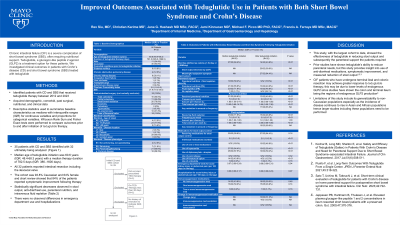Tuesday Poster Session
Category: IBD
P3584 - Improved Outcomes Associated with Teduglutide Use in Patients With Both Short Bowel Syndrome and Crohn's Disease
Tuesday, October 24, 2023
10:30 AM - 4:00 PM PT
Location: Exhibit Hall

Has Audio

Rex K. Siu, MD, MSc
Mayo Clinic School of Graduate Medical Education
Jacksonville, FL
Presenting Author(s)
Rex K. Siu, MD, MSc1, Christian Karime, MD2, Jami Kinnucan, MD, FACG3, Michael F.. Picco, MD, PhD, FACG3, Francis A. Farraye, MD, MSc, MACG2, Jana G.. Hashash, MD, MSc, FACG2
1Mayo Clinic School of Graduate Medical Education, Jacksonville, FL; 2Mayo Clinic, Jacksonville, FL; 3Mayo Clinic Florida, Jacksonville, FL
Introduction: Intestinal failure is a severe complication of short bowel syndrome (SBS), often requiring nutritional support. Teduglutide (TED) promotes gastrointestinal (GI) function in patients with SBS through an intestinotrophic effect. Clinical experience is scarce in patients with Crohn’s Disease (CD) and SBS. We investigated clinical outcomes in patients with CD and SBS treated with TED.
Methods: Adult patients with CD and SBS who subsequently received TED were identified at a tertiary care academic center between 2012-2023. Demographic, comorbid, and clinical data was collected retrospectively. Clinical outcomes were compared in the period before and after TED therapy, including subjective symptom improvement, bowel habits, parenteral nutritional support (PNS), use of antidiarrheal agents, and emergency care usage. Statistical analysis was performed using Wilcoxon Rank Sum and Fisher Exact.
Results: We identified 33 patients (33% male, 93% Caucasian) with CD and SBS initiated on TED at a median age of 60.7 years (IQR 47.5-68.2). Median TED was 765 days (IQR 406-1562). The most common comorbid conditions were chronic kidney disease (27%) and diabetes (18%), with median Charlson comorbidity index of 3.0 (IQR 1.0-5.0). Of 33 patients, 97% had undergone >1 GI surgery (78% small bowel resection and 48% total colectomy with 69% having an ileostomy). 1 patient without surgical resections had extensive ileocolonic disease resulting in malabsorption requiring PNS and TED. Comparing clinical outcomes before vs after TED, 84% of patients reported subjective symptom improvement, with 87% reporting stool output decrease of >30%. Patients meeting clinical criteria for diarrhea decreased by 53.6% (p< 0.01), with median unique antidiarrheal medication use decreasing from 3.0 to 2.0 (p< 0.01) (Table 1). Of 21 patients requiring parenteral nutrition, 85% noted a reduction following TED initiation, with significant reduction in weekly infusion frequency (7.0 vs 3.0, p< 0.01) and amount (10.5L vs 3.5L, p< 0.01). In 23 patients requiring fluid or electrolyte support, 69.6% noted a reduction, with decrease in weekly infusion frequency (7.0 vs 3.0, p< 0.01) and weekly amount (7.0L vs 3.5L, p< 0.01). No differences were seen in emergency care usage.
Discussion: In the current study, clinical outcomes improved in patients with CD and SBS treated with TED. Results also indicated that TED decreased the need for PNS. Large-scale prospective studies are needed to establish efficacy of findings to non-Caucasian patients.
Disclosures:
Rex K. Siu, MD, MSc1, Christian Karime, MD2, Jami Kinnucan, MD, FACG3, Michael F.. Picco, MD, PhD, FACG3, Francis A. Farraye, MD, MSc, MACG2, Jana G.. Hashash, MD, MSc, FACG2. P3584 - Improved Outcomes Associated with Teduglutide Use in Patients With Both Short Bowel Syndrome and Crohn's Disease, ACG 2023 Annual Scientific Meeting Abstracts. Vancouver, BC, Canada: American College of Gastroenterology.
1Mayo Clinic School of Graduate Medical Education, Jacksonville, FL; 2Mayo Clinic, Jacksonville, FL; 3Mayo Clinic Florida, Jacksonville, FL
Introduction: Intestinal failure is a severe complication of short bowel syndrome (SBS), often requiring nutritional support. Teduglutide (TED) promotes gastrointestinal (GI) function in patients with SBS through an intestinotrophic effect. Clinical experience is scarce in patients with Crohn’s Disease (CD) and SBS. We investigated clinical outcomes in patients with CD and SBS treated with TED.
Methods: Adult patients with CD and SBS who subsequently received TED were identified at a tertiary care academic center between 2012-2023. Demographic, comorbid, and clinical data was collected retrospectively. Clinical outcomes were compared in the period before and after TED therapy, including subjective symptom improvement, bowel habits, parenteral nutritional support (PNS), use of antidiarrheal agents, and emergency care usage. Statistical analysis was performed using Wilcoxon Rank Sum and Fisher Exact.
Results: We identified 33 patients (33% male, 93% Caucasian) with CD and SBS initiated on TED at a median age of 60.7 years (IQR 47.5-68.2). Median TED was 765 days (IQR 406-1562). The most common comorbid conditions were chronic kidney disease (27%) and diabetes (18%), with median Charlson comorbidity index of 3.0 (IQR 1.0-5.0). Of 33 patients, 97% had undergone >1 GI surgery (78% small bowel resection and 48% total colectomy with 69% having an ileostomy). 1 patient without surgical resections had extensive ileocolonic disease resulting in malabsorption requiring PNS and TED. Comparing clinical outcomes before vs after TED, 84% of patients reported subjective symptom improvement, with 87% reporting stool output decrease of >30%. Patients meeting clinical criteria for diarrhea decreased by 53.6% (p< 0.01), with median unique antidiarrheal medication use decreasing from 3.0 to 2.0 (p< 0.01) (Table 1). Of 21 patients requiring parenteral nutrition, 85% noted a reduction following TED initiation, with significant reduction in weekly infusion frequency (7.0 vs 3.0, p< 0.01) and amount (10.5L vs 3.5L, p< 0.01). In 23 patients requiring fluid or electrolyte support, 69.6% noted a reduction, with decrease in weekly infusion frequency (7.0 vs 3.0, p< 0.01) and weekly amount (7.0L vs 3.5L, p< 0.01). No differences were seen in emergency care usage.
Discussion: In the current study, clinical outcomes improved in patients with CD and SBS treated with TED. Results also indicated that TED decreased the need for PNS. Large-scale prospective studies are needed to establish efficacy of findings to non-Caucasian patients.
Disclosures:
Rex Siu indicated no relevant financial relationships.
Christian Karime indicated no relevant financial relationships.
Jami Kinnucan: Abbvie – Advisory Committee/Board Member, Consultant. BMS – Advisory Committee/Board Member, Consultant. Fresinius kabi – Advisory Committee/Board Member, Consultant. Janssen – Advisory Committee/Board Member. Pfizer – Advisory Committee/Board Member, Consultant. Takeda – Advisory Committee/Board Member, Consultant.
Michael Picco indicated no relevant financial relationships.
Francis Farraye: AbbVie – Advisory Committee/Board Member. Avalo Therapeutics – Advisory Committee/Board Member. BMS – Advisory Committee/Board Member. Braintree Labs – Advisory Committee/Board Member. Fresenius Kabi – Advisory Committee/Board Member. GI Reviewers – Independent Contractor. GSK – Advisory Committee/Board Member. IBD Educational Group – Independent Contractor. Iterative Health – Advisory Committee/Board Member. Janssen – Advisory Committee/Board Member. Pfizer – Advisory Committee/Board Member. Pharmacosmos – Advisory Committee/Board Member. Sandoz Immunology – Advisory Committee/Board Member. Sebela – Advisory Committee/Board Member. Viatris – Advisory Committee/Board Member.
Jana Hashash: Iterative Health – Grant/Research Support.
Rex K. Siu, MD, MSc1, Christian Karime, MD2, Jami Kinnucan, MD, FACG3, Michael F.. Picco, MD, PhD, FACG3, Francis A. Farraye, MD, MSc, MACG2, Jana G.. Hashash, MD, MSc, FACG2. P3584 - Improved Outcomes Associated with Teduglutide Use in Patients With Both Short Bowel Syndrome and Crohn's Disease, ACG 2023 Annual Scientific Meeting Abstracts. Vancouver, BC, Canada: American College of Gastroenterology.
